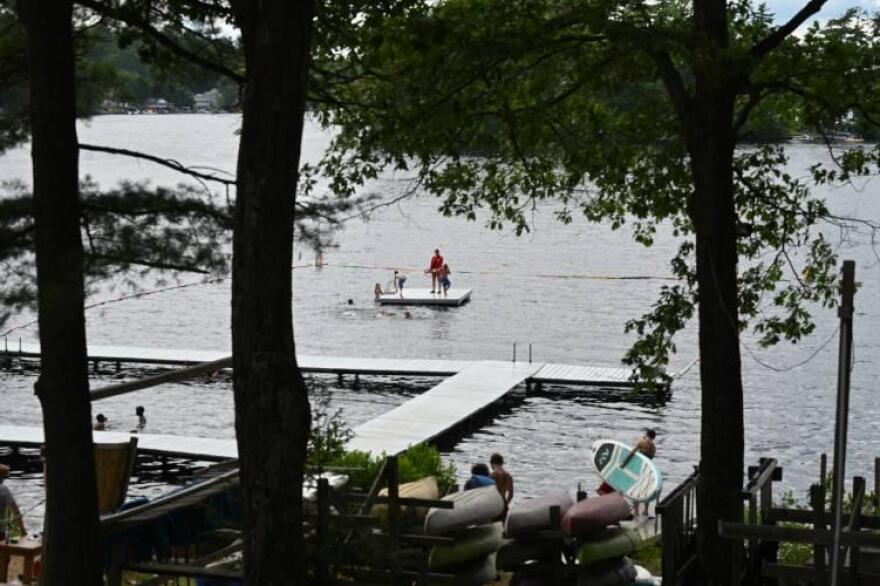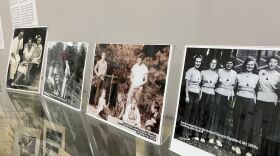Connor knew what he needed to say as he stood on the porch of the boys’ cabin and watched Brian Lobao cross a gully of woodchips in his direction.
He fidgeted nervously with his basketball shorts, but the words sprang from his mouth sounding earnest and self-assured.
“Are you the founder?” he asked, sticking out his hand. “Thank you. This is my second year.”
Beside him, Shawn, a younger boy with sleek hair, scrambled on hands and knees to corral several red plastic fishing floats that raced across the porch. And twirling a fishing rod between his thumb and forefinger, Jason — at 14 the oldest of the bunch — reclined in a lawn chair and occupied himself with thoughts of hooking bluegill, smallmouth bass and catfish in Northwood Lake. “When I’m out on the water, either I catch something or I don’t, but I go home with my head held high,” Connor told them both, eyes grinning.
Their visitor chuckled.
While he may not have pre-ordained their friendship, Lobao, the founder of Lantern Light Camp, had molded the Wah-Tut-Ca Reservation in Northwood into a place where children could climb, swim, explore and revel in being untamed. The Boy Scouts, now known as Scouting America, had run a camp at the reservation for more than 80 years. The organization’s declining membership and numerous lawsuits forced the camp’s closure in 2019. But believing there was “still magic in the woods,” Lobao mobilized to rebuild on the same land. Lantern Light Camp was born.
He’d envisioned a camp where every child could disconnect from technology and reconnect with nature, and where no child would be refused. “We didn’t want to become a rich kids’ camp. New Hampshire has plenty of those,” he said.
Then, on a Wednesday afternoon in 2020, the summer Lobao piloted the new camp, a grandmother called. She’d found out about Lantern Light through Kinship Navigator, a state-sponsored program in Massachusetts that provides support for familial caregivers, including grandparents raising their grandchildren. When camp kicked off on Sunday morning, her two pre-teen grandkids were in Northwood, rolling down the gravel road to camp in a clunker of a car, their grandmother’s boyfriend at the wheel.
Lobao later found the children bobbing and floating in a shallow part of the lake. Most kids boast of how quickly they’re able to graduate from the beginner swim areas; these children wanted to know if they could stay for longer, he remembered.
“I don’t know what this experience is going to be in the annals of the rest of their life, but maybe for the first time in their lives these kids got to be kids, and that’s got to be worth something,” he said.
Lantern Light Camp Founder Brian Lobao estimates nearly half of his current campers are being raised, at least in part, by their grandparents.
Since then, the camp has worked with more organizations, including Granite State United Way, to connect with grandparents raising grandchildren and with donors to ensure that, regardless of their ability to pay the camp’s $1,000-a-week tuition, all caregivers are able to send their children to Lantern Light. By Lobao’s estimate, nearly half of his current campers are being raised, at least in part, by their grandparents, including two of the three boys at the cabin.
About 9% of grandparents live with their grandchildren in what have commonly been known as “grandfamilies,” according to 2024 data from the U.S. Census Bureau. Almost one-in-five children lived in multigenerational settings where at least one is present.
In households financially maintained by grandparents, the percentage of minor co-resident grandchildren who were in poverty was slightly higher than in parent-maintained households. More than three-quarters of all grandchildren under the age of 18 living with their grandparents lived in households that received public assistance, most often through school lunch programs.
Lobao, who was raised by a single mother in a “very poor part” of Lowell, Massachusetts, and who had been a camper at the Wah-Tut-Ca Reservation as an 11-year-old Boy Scout, knew the life-changing potential of an outdoor summer camp for children experiencing need. An ardent proselytizer for Jonathan Haidt’s book “The Anxious Generation,” he also knew the joys of an unplugged childhood were becoming increasingly rare.
“There is an urgent social need for kids to get outdoors, because right now, this is all we have for our children,” he said, interlacing his fingers and twiddling his thumbs over an imaginary phone. “What we say all the time is, ‘We like to introduce them to their other eight fingers.’”
That need, he stressed, is even more pressing for children who are being raised by grandparents who might not have the mobility, energy or financial means to bring kids outdoors and keep them active. The goal for Emma Sebastian, the program director at Lantern Light, is to provide kids’ experiences at camp with the world beyond their phones to enrich their lives once they return home.
Sebastian leads a staff of 34 counselors, waterfront staff and kitchen staff, as well as 320 campers. Children who are being raised by their grandparents can be, in her experience, more shy and reserved, but relay races and water carnivals and games of capture-the-flag are a foolproof recipe for bringing kids out of their shells.
Camp changes children, she said. Sebastian still remembers a young boy who lived with his grandparents, for whom home-cooked meals were not the norm.
“We were up at Frontier learning how to cook food and he was very happy,” she said. “He was like, ‘This is awesome, maybe I can go home and cook a real meal for my family now.’”
Sebastian and Lobao are careful to approach grandparents about a subsidized camp without exacerbating potential feelings of shame over any limitations they might have as caregivers, financial, mobile or otherwise.
“What I stress with them is that I thank God every single day that I had the opportunity to come here and that wonderful people guided me and helped me. I grew up here and I grew up in this environment, and I’m very grateful. And if it was important to my generation and my circumstance, it’s much more important for this particular generation,” he said.
At lunch time, Connor strapped on his fanny pack and walked with Jason to the cafeteria for Italian sausage dogs and tater tots. The area director of the ‘Frontier,’ a teenager only a few years older than they, would help them cook their catch once they returned from casting their lines into the lake.
The only thing he enjoys more than fishing at Lantern Light, Connor said, is making memories.
“Usually, I would just kind of chill at home,” he said. “But memories, yeah, that’s why I like being here a lot.”
These articles are being shared by partners in the Granite State News Collaborative. For more information, visit collaborativenh.org.






